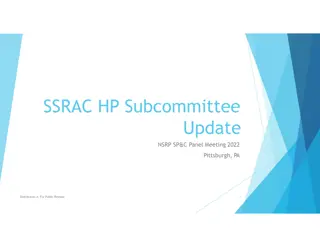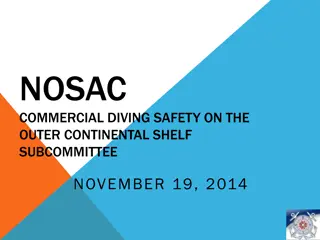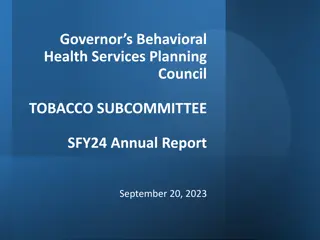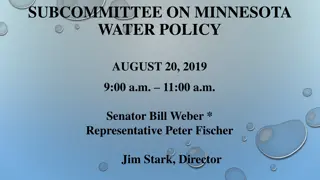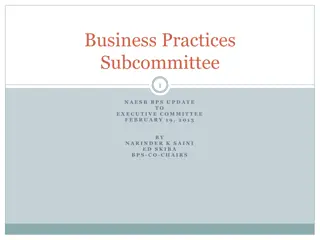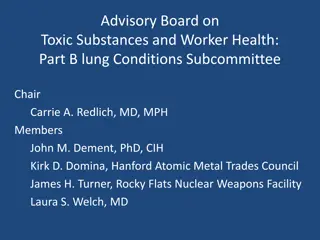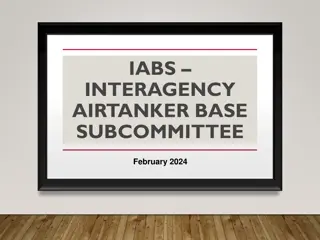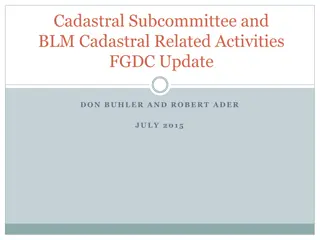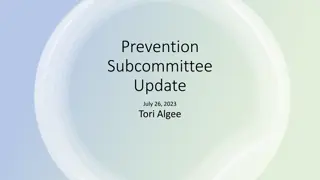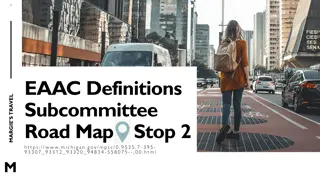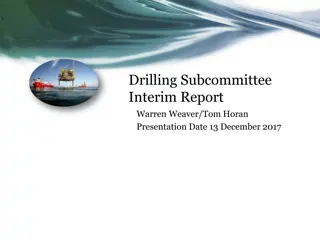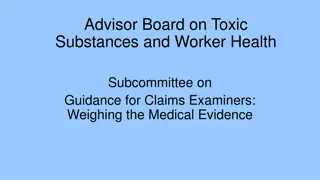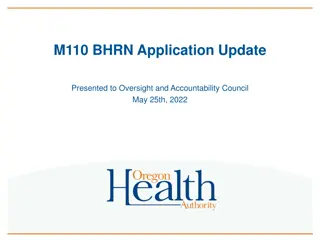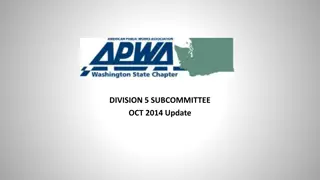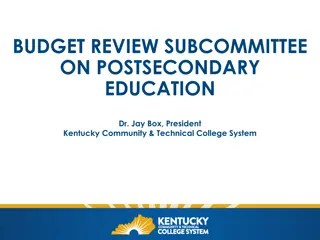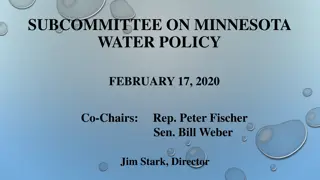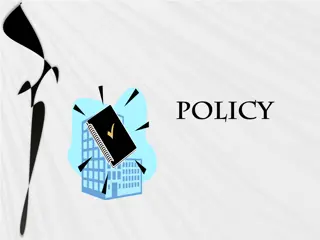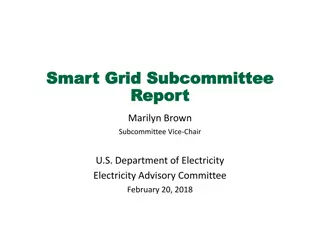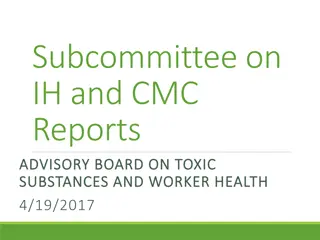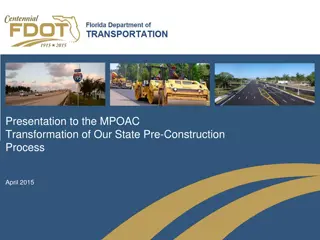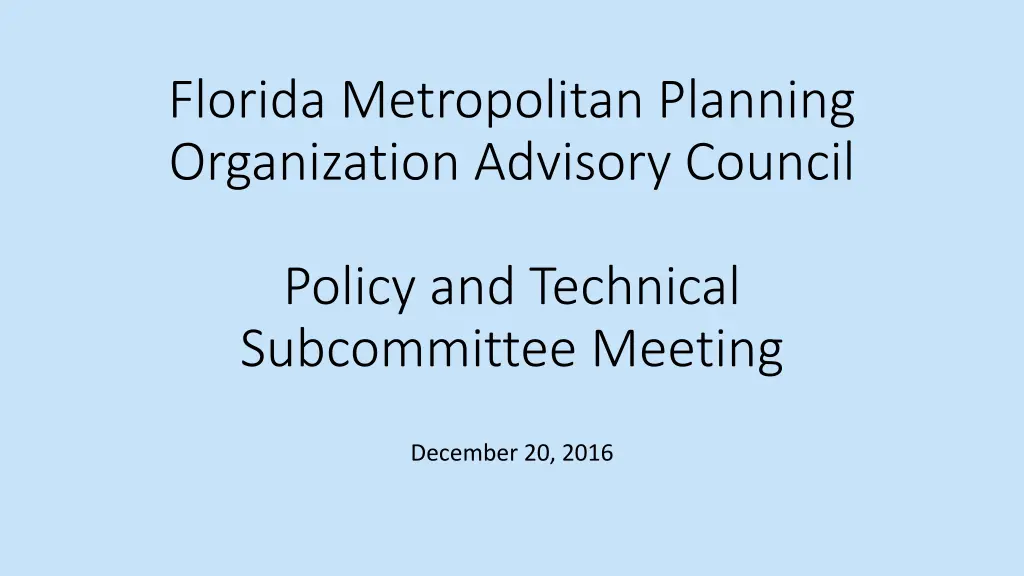
Florida Metropolitan Planning Organization Advisory Council Meeting Recap
Discover key highlights from the Florida Metropolitan Planning Organization Advisory Council Policy and Technical Subcommittee Meeting held on December 20, 2016. Topics covered include a call to order, public comments, discussions on changing meeting dates for 2017, revising bylaws, updates on PL funding, and an FDOT MPO Handbook update.
Uploaded on | 0 Views
Download Presentation

Please find below an Image/Link to download the presentation.
The content on the website is provided AS IS for your information and personal use only. It may not be sold, licensed, or shared on other websites without obtaining consent from the author. If you encounter any issues during the download, it is possible that the publisher has removed the file from their server.
You are allowed to download the files provided on this website for personal or commercial use, subject to the condition that they are used lawfully. All files are the property of their respective owners.
The content on the website is provided AS IS for your information and personal use only. It may not be sold, licensed, or shared on other websites without obtaining consent from the author.
E N D
Presentation Transcript
Florida Metropolitan Planning Organization Advisory Council Policy and Technical Subcommittee Meeting December 20, 2016
Call to Order Peter Buchwald, Chair
New Calendar for 2017 Meetings WHY? Request to change the meeting dates of the Staff Directors Advisory Committee One month before the Governing Board Meeting Requires a change to the MPOAC Bylaws Will allow the Staff Directors more direct input to the Governing Board agenda items
New Calendar Dates for 2017 Meetings Assuming the First Thursday Methodology As agreed to by MPOAC at the April 2016 Meeting January No change 2nd Quarter April 6th Governing Board Meeting March 2nd Staff Directors Meeting 3rd Quarter July 19th Governing Board Meeting Held in conjunction with Floridians for Better Transportation June 1st Staff Directors Meeting July 8th would not allow enough time to prepare a meeting packet for Governing Board 4th Quarter November 6-7 Planned Governing Board Meeting and Staff Directors October 5th Staff Directors Meeting
Bylaws Revision Carl Mikyska Paul Gougelman
Looked over the bylaws comprehensively Started with idea of Staff Directors meeting 1 month prior to Governing Board Expanded definition of MPO, eliminated TPO definition No more Chairperson, Chairman, etc only Chair and Vice-Chair Allow for two alternates to represent your organization at meetings No more sub-committees, just committees Align the appointment of leadership positions with elections Flexibility in naming member organizations Agendas distributed 10 days in advance of meeting
Direct PL Funding Update Carl Mikyska
FDOT MPO Handbook Update Sean Santalla, FDOT
Revenue Forecast Efforts Martin Markovich, FDOT Regina Colson, FDOT
Strategic Plan Implementation Carl Mikyska
MPOAC Strategic Plan Working Groups Strategic Directions Working Groups Survey Results Communications WG 16 Bike & Pedestrian WG 35.5 Training WG 29.5 Best Practices WG 36 0 5 10 15 20 25 30 35 40
MPOAC Strategic Plan Working Groups Next Steps Form 2 committees Bike & Pedestrian Committee Best Practices Committee Select committee members and chair Direct your Executive Director to work with each chair to develop a work plan for committee approval
FDOT Financial Risk Assessment of MPOs Sean Santalla, FDOT
Legislative Policy Positions of MPOAC Carl Mikyska
The MPOAC supports State Legislation that: Implements the recommendations from the MPOAC transportation revenue study and other options for expanding transportation revenue sources. Restores funding for the Transportation Regional Incentive Program in order to promote regional planning and project development through sustainable funding mechanisms, in addition to documentary stamp revenues. Regulates distracted driving as a primary offense by prohibiting the use of electronic wireless communications devices and other similar distracting devices while operating a moving motor vehicle. Allows Strategic Intermodal System (SIS) funds to be used on roads and other transportation facilities not designated on the SIS if the improvement will enhance mobility or support freight transportation on the SIS. Establishes state funding for railroad crossings to improve safety and establish quiet zones.
Implements the recommendations from the MPOAC transportation revenue study and other options for expanding transportation revenue sources. Key Recommendations: Expand the Charter County and Regional Transportation System Surtax to allow municipalities over 150,000 in population (or the largest municipality in a county) and all counties located in MPO areas to enact up to a one cent local option surtax by referendum. Index local option fuel taxes to the consumer price index in a manner similar to the current indexing of state fuel taxes. Direct the Florida Department of Transportation to develop a plan and conduct one or more pilot tests to move Florida toward a Mileage Based User Fee, which protects individual privacy, in lieu of the traditional fuel tax.
Regulates distracted driving as a primary offense by prohibiting the use of electronic wireless communications devices and other similar distracting devices while operating a moving motor vehicle. The 2013 Florida legislature enacted the Florida Ban on Texting While Driving Law. The law prohibits operation of a moving motor vehicle while manually typing, sending or reading interpersonal communication (texting, e-mailing, instant messaging, etc.) using a wireless communications device, with certain exceptions. The law provides for enforcement of the ban as a secondary offense, meaning a driver would have to be pulled over for some other violation to get a ticket for violating the ban on texting. The 2014 and 2015 Florida Legislatures underscored the severity of distracted driving by considering bills that would have substantially increased the penalty for distracted driving. This legislative proposal would seek to strengthen the enforcement mechanism for the texting while driving ban by making it a primary offense.
Restores funding for the Transportation Regional Incentive Program in order to promote regional planning and project development through sustainable funding mechanisms, in addition to documentary stamp revenues.
Allows Strategic Intermodal System (SIS) funds to be used on roads and other transportation facilities not designated on the SIS if the improvement will enhance mobility or support freight transportation on the SIS. Current state law does not permit SIS funds to be spent on roads or other transportation facilities that are not part of the SIS, even if proposed improvements would directly benefit users of SIS facilities by enhancing mobility options or supporting freight movement in a SIS corridor. This legislative proposal would broaden the State s ability to improve passenger and freight mobility on SIS corridors by making eligible the expenditure of SIS funds on non SIS roads and other transportation facilities where the benefit to users of SIS facilities can be demonstrated.
Establishes state funding for railroad crossings to improve safety and establish quiet zones. This proposal recognizes growing economic activity at Florida s ports and provides financial support to ensure the continued quality of life and safety in communities along increasingly busy rail corridors.
Autonomous and Electric Vehicles? Include a supportive policy? MPOAC supports the implementation of an electric vehicle charging network across Florida. MPOAC supports the advancement of autonomous vehicles in Florida.
MPOAC Financial Guidelines for LRTPs Jeff Kramer
LRTP Reviews Jeff Kramer
FL LRTP Reviews Jeff Kramer, AICP MPOAC Policy and Technical Subcommittee December 20, 2016 Center for Urban Transportation Research | University of South Florida
Background/Purpose Prior Reviews in 1997, 2002, 2008 and 2013 Purpose: Observations: identify current practices and compare to previous practices Suggestions: prompt change in practice ahead of next update cycle Estimate statewide shortfall in metropolitan areas
Example Changes in Practice Statewide financial guidelines Uniform LRTP horizon years; Needs plan guidance; Include TIP years Shortfall estimate used to champion increased transportation spending Basis for MPOAC Revenue Study and Policy Positions Coordination between: LRTPs, FTP and other state plans; input to FTP Neighboring MPOs; regional coordination studies
Example Changes in Practice Improved user friendliness no model output; executive summaries; brochures More descriptive LRTPs; fewer sanitized plans Clearer linkages between LRTP projects and goals
2013 Sample Suggestions Appropriate needs plan projects Determine transit needs beyond the 10-year window of the TDP Be clear about tradeoffs More focus on freight movement Scenario planning Describe how public input informed decisions Mitigation and adaptation strategies
Timing to Review of 2040 LRTPs? Last adopted 2040 LRTP 3/2017 First adopted 2045 LRTP 10/2019
What Would It Take? Review all 27 MPO plans and supporting documentation Follow-up with MPOs as needed Develop generalized statewide observations and document unique practices Develop shortfall model (Needs plan costs v. estimated revenues) Estimate individual MPO shortfall Estimate statewide shortfall
What Would It Take? Part II Approximate schedule 18 months Approximate cost $175k Potential source of funding PL reserve Spread across 2 to 3 fiscal years
Questions? Jeff Kramer Center for Urban Transportation Research University of South Florida kramer@cutr.usf.edu 813-974-1397
Member Comments Issues and comments for the good of the cause
Adjournment Next meeting Partnering with the 2017 Safe Streets Summit January 26, 2017 Sunrise, Florida DoubleTree by Hilton 13400 West Sunrise Boulevard, Sunrise, FL 33323

